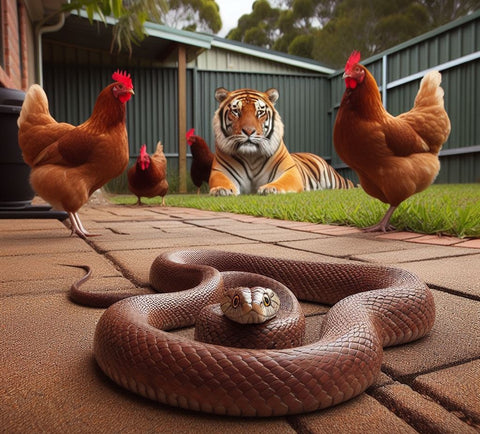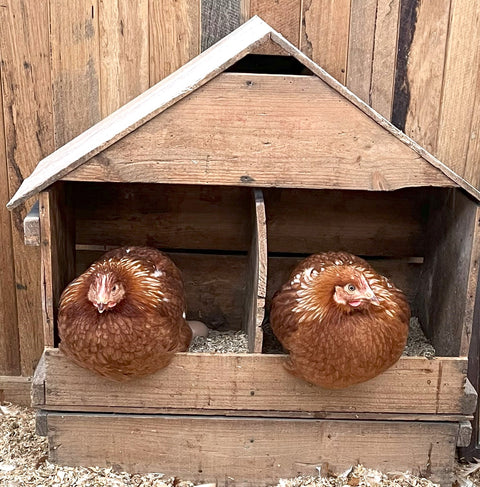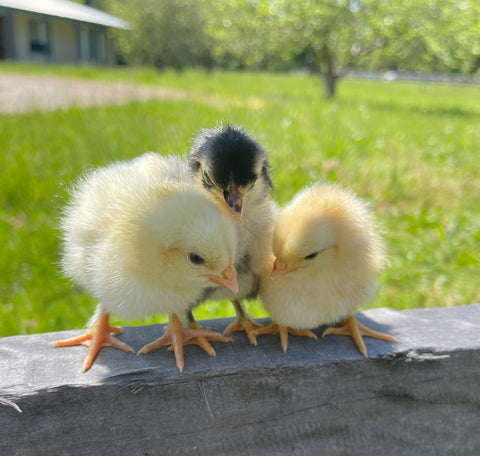In suburban Melbourne and its outer reaches, if you encounter a snake, it’s most likely to be a Tiger (unlike the photo!), Eastern Brown, Red-Bellied Black or Lowland Copperhead. Unfortunately for us, they’re all venomous and can happily slither their way towards our chicken coops!
Now, the real truth about snakes is that there’s no miracle solution. However, there are things you can do to reduce the chances of them visiting your chicken coop.
Unsurprisingly, snakes are more active in the warmer weather of spring and summer. This is because snakes are what’s called “ectothermic” which means that they rely on external heat sources to operate efficiently being cold-blooded. In the colder months of autumn and winter, snakes enter a state called “brumation” where they are much less active.
Urban Hideouts
Don't be surprised to find snakes in your backyard and even during winter. They may seek warmth in sunny patches, under decking or even coiled near hot water pipes. In your garden, they’re attracted to long grass, rocks, stacks of branches, timber or building material where they can take cover and feel safe.
On the upside though, they’re not interested in people nor your chooks. It’s either the rodents (that are attracted to chicken feed), or a cool sip of water from your girls’ drinker that they’re after. This is another good reason to use a hook and chain to hang your drinkers and feeders at least 30cm above the ground and avoid the use of dishes and bowls.
Why are snakes a risk?
Snakes are a celebrated part of the Australian landscape and only pose a risk if they perceive they’re under attack. So, if a snake ends up in your coop, your chickens might get bitten if they decide to have a wee peck at it.
Perhaps the greater concern though is with young children who may inadvertently startle or step on a snake that’s found a comfortable corner to rest.
Close encounters with a tiger snake
I once had a tiger snake visit our hens on a farm that we were renting in Main Ridge, on the Mornington Peninsula back in 2018. It was February and the snake entered through a gap in the corner of the large shed where we were operating the business from. The snake had slid in behind a trellis that had been propped against the wall seemingly intrigued by the activity of the chickens.
The hens were on edge with their heads up and they were nervously squawking in alarm. Not wanting to miss out on any food opportunity resembling a giant earthworm, they increasingly plucked up the courage to get closer and closer towards the trellis.
One girl, clearly unconcerned with OH&S protocol, decided to confirm the worm theory by giving the snake a quick peck in a gap in the trellis. Wisely, the snake beat a hasty retreat and once safely outside the barn, headed straight into the nearest drain pipe.
Take these steps to prevent snake visits:
- Remove potential places of shelter – timber, branches, building equipment, metal sheets etc around your chicken coop
- Don’t allow grass around the coop to get long
- Eradicate places in and around the coop where snakes can hide
- Where possible, retain and plant native trees that attract kookaburras who include young snakes in their diet
- Install tight mesh on your chicken coop and run that is no wider than 10mm gauge
- Fully enclose the coop and run and plug any holes that rodents or snakes could enter through
- Store feed in a rodent-proof, airtight container
- Set traps for mice and rats (keep well away from chickens)
Attend a snake education program
Many local councils in Melbourne conduct snake education programs to help residents better understand these reptiles. These programs often include workshops, informational sessions and practical demonstrations on identifying and safely managing potential snake encounters. These programs can provide valuable insights and equip you with the knowledge needed to understand and reduce some of the fears that you may have.
One such program run by the Mornington Peninsula Shire Council is being held locally on the 23rd of January 2024. You can learn more and make a booking here: The Briars Snake Awareness Program
Emergency response plan
Similarly to creating a good bushfire plan, developing a snake emergency response plan is a great idea. This plan should include contact information for licensed snake catchers in your area and guidelines on how best to safely evacuate humans and animals from the vicinity. Being well-prepared helps greatly in minimising risks associated with snake encounters.
What do you do if there’s a snake in the coop?
Follow your snake emergency response plan! If without one, remember to never attempt to remove a snake yourself. Instead, safely clear chickens and other pets away then call the Department of Environment. Land, Water and Planning (DELWP) on 136 186 for further advice or contact a licensed snake catcher.
It’s illegal to capture, harm or kill snakes. They are protected under the Wildlife Act 1975.









Comments (1)
Thank you any information keeping snakes at bay is helpful and worth having in care of our hens. Reminders too, to keep long grass around runs down. We’ve had snakes around at times but so far not near our hens, they are certainly about. Cheers V